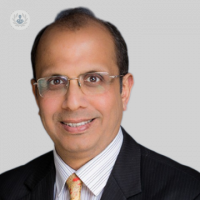Which medical conditions can gastric sleeve surgery help to treat?
Written by:Gastric sleeve surgery, a type of bariatric procedure, can help patients to lose a life-changing amount of excess weight if they commit to impactful lifestyle changes and diet and exercise plans following surgery. In addition, gastric sleeve surgery can greatly help to reduce the severity of some other conditions which often accompany obesity, including type 2 diabetes, osteoarthritis and sleep apnoea, in some cases, even completely reversing the disease.
In this informative article for patients considering gastric sleeve surgery, highly respected consultant surgeon and specialist in bariatric surgery Mr Sanjay Agrawal shares his expert insight on how and to what extent gastric sleeve surgery helps patients to lose excess weight and the impact the operation can have on other conditions, including high blood pressure and non-alcoholic fatty liver disease (NAFLD).

Can I lose all my excess weight with gastric sleeve?
Although gastric sleeve surgery can be an effective tool for weight loss, it does not guarantee that you will lose all of your excess weight. The extent of weight loss following gastric sleeve surgery can vary depending on a number of factors, including the patient's adherence to a healthy diet and exercise plan, their pre-surgery weight and overall health, as well as the surgeon's technique.
On average, patients lose between fifty and sixty per cent of their excess weight within the first year following gastric sleeve surgery. However, some patients may lose more weight, while others may not lose as much. It's important to remember that weight loss after gastric sleeve surgery levels off after the first year. Some people may be able to on to lose further weight but this depends on their commitment to a healthy lifestyle.
It's important to keep in mind that gastric sleeve surgery is not a magic solution for weight loss, and it requires a significant change in lifestyle and behavioural patterns. Patients will need to follow a strict diet and exercise plan and long-term lifestyle changes are necessary in order to maintain weight loss.
What medical conditions can gastric sleeve surgery help to treat?
Gastric sleeve surgery is primarily used for weight loss in people who are morbidly obese (with a BMI of 40 or higher). Additionally, this type of surgery may be performed for patients with a BMI between 35 and 39.9 who have significant health problems resulting from obesity.
Gastric sleeve surgery reduces the amount of food the stomach can hold, giving the patient a feeling of fullness after eating just a small amount of food. This reduction in food intake results in weight loss and additionally, the surgery also affects the hormones that control hunger, causing a decrease in appetite.
A number of obesity-related medical conditions can be improved or even resolved by gastric sleeve surgery. These include:
- Type 2 diabetes
- High blood pressure, which can be reduced following gastric sleeve surgery and mean that medication is no longer required
- Sleep apnoea
- Osteoarthritis
- Non-alcoholic fatty liver disease (NAFLD)
Gastric sleeve surgery is not recommended for people who are pregnant, have active infection, severe heart or lung disease, or have a history of cancer. It's important to consult a qualified surgeon and have a thorough evaluation to help you decide if gastric sleeve surgery is right for you.
What are the effects of gastric sleeve surgery in obese patients with hypertension?
Gastric sleeve surgery is a type of weight loss surgery which can help make significant improvements in high blood pressure (hypertension) in obese patients. In surgery of this type, the amount of food that the stomach can hold is reduced, leading to a feeling of fullness after eating only a small amount of food.
Weight loss results from a reduced intake of food and in turn this weight loss can improve hypertension. In addition, gastric sleeve surgery also affects the hormones in our body which control hunger, causing the appetite to decrease which may further contribute to weight loss.
Various studies have shown that gastric sleeve surgery can significantly reduce blood pressure in obese patients with hypertension. In a study of obese patients with high blood pressure, gastric sleeve surgery led to a mean reduction in systolic blood pressure of 20 mm Hg and a mean reduction in diastolic blood pressure of 12 mm Hg.
Although very impactful, gastric sleeve surgery is not a magic solution for high blood pressure. Following surgery of this type, patients will need to commit to long-term lifestyle changes to maintain their weight loss and blood pressure control. Additionally, it's important to continue taking blood pressure medications as prescribed by your doctor, even if your blood pressure improves after surgery.
When deciding if gastric sleeve surgery is the right option for you, you should consult with a qualified surgeon and a multidisciplinary team, including a dietitian, a psychologist, and a primary care physician. Your surgeon will discuss the potential benefits and risks of the surgery with you, including the impact of the surgery on hypertension.
If you are considering gastric sleeve surgery and wish to schedule a consultation with Mr Agrawal, you can do so by visiting his Top Doctors profile.


